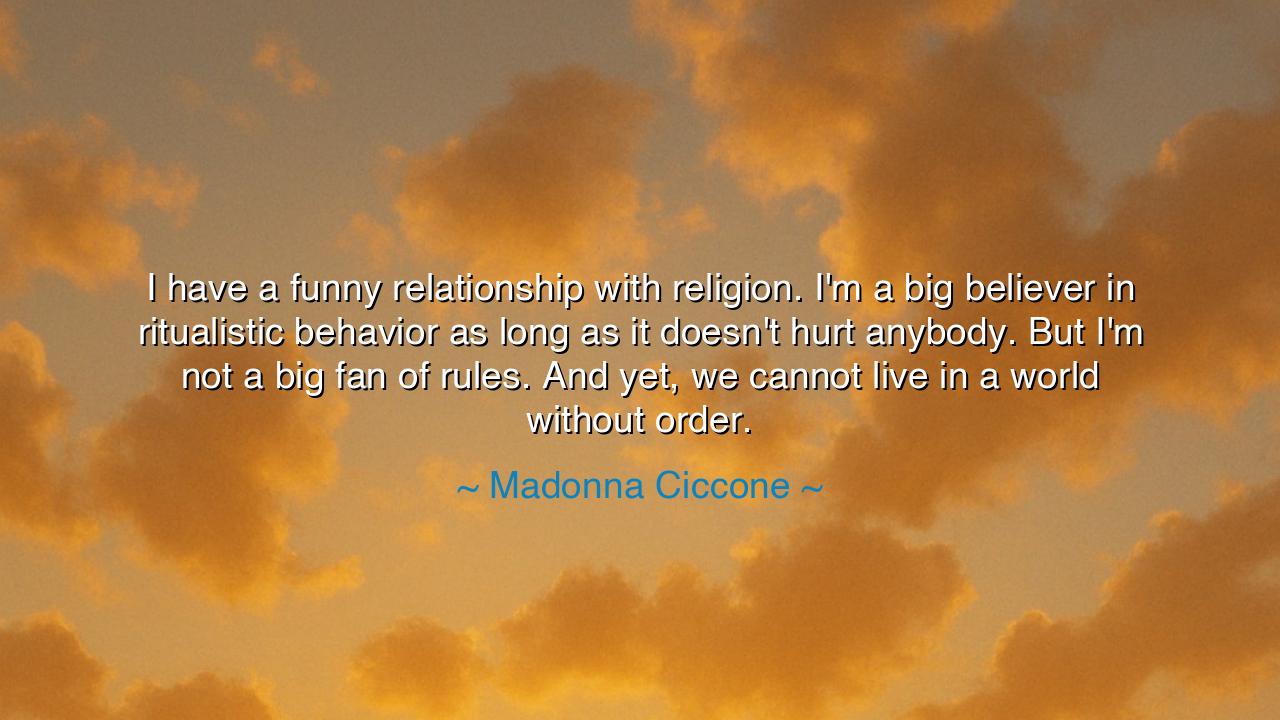
I have a funny relationship with religion. I'm a big believer in
I have a funny relationship with religion. I'm a big believer in ritualistic behavior as long as it doesn't hurt anybody. But I'm not a big fan of rules. And yet, we cannot live in a world without order.






The words of Madonna Ciccone, “I have a funny relationship with religion. I’m a big believer in ritualistic behavior as long as it doesn’t hurt anybody. But I’m not a big fan of rules. And yet, we cannot live in a world without order,” reveal the timeless struggle between freedom and structure, spirit and law. She speaks as one who honors the power of ritual while questioning the chains of rigid command, seeking a path where the soul may breathe yet society may endure.
The relationship with religion has ever been complex. To some, it is a refuge; to others, a burden. Madonna names its dual nature: the beauty of ritualistic behavior, which binds communities, comforts the heart, and gives rhythm to life, and the weight of rules, which can suffocate when applied without compassion. This is the ancient tension between form and spirit, between the letter that kills and the spirit that gives life.
Yet she does not cast away all rules, for she knows that a world without order falls into chaos. To despise rules entirely is to invite anarchy; to cling to them without mercy is to stifle freedom. Wisdom lies in the middle path — embracing the rituals that uplift and the structures that protect, while rejecting those decrees that wound or enslave.
Thus, her words teach future generations that faith, ritual, and law must always be measured against love and justice. Religion may offer beauty through ritual, but it must not harm; rules may shape society, but they must not destroy the soul. Let it be remembered: the dance between freedom and order is eternal, and each soul must learn to walk it with courage and discernment.






UGUser Google
Madonna’s view on religion, especially the conflict between ritual and rules, reflects a deeper philosophical question. Can we live harmoniously in a society without strict rules, or does the need for order inevitably conflict with personal freedom? Is it possible to honor tradition without being bound by rules? How do we balance respecting others' beliefs with the desire for autonomy in our own lives?
HK10CT2-22- Tran Hoang Khoi
I appreciate Madonna’s honesty here—she embraces ritual but is critical of rules, which speaks to the tension between freedom and structure. Her statement challenges the idea of rigid order in society. It got me thinking: can we have a structured society without imposing too many rules, or is some form of regulation necessary for a functional world? Where should we draw the line between flexibility and order?
MAMac Minh Anh
Madonna’s perspective on religion is intriguing. She seems to value ritual for the sense of meaning it brings, but dislikes the constraints of rules. It makes me wonder—how much of our daily lives are shaped by rituals or traditions that we follow without ever questioning them? Can we find a balance between personal freedom and the need for order, or do rules inherently conflict with our individuality?
MTDao Minh Tam
Madonna’s thoughts on religion and ritual really make me think about the balance between tradition and individuality. She appreciates ritual as long as it doesn’t harm others, but also questions the rigidity of rules. It raises an interesting point—how can we maintain some structure in life while also allowing space for personal freedom? Do we need rules, or can society function on mutual respect and understanding instead?